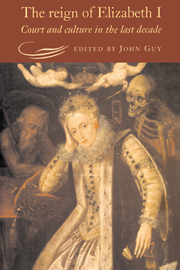Book contents
- Frontmatter
- Contents
- List of figures
- Preface
- List of contributors
- List of abbreviations
- Introduction The 1590s: the second reign of Elizabeth I?
- 1 The patronage of the crown in Elizabethan politics: the 1590s in perspective
- 2 Regnum Cecilianum? A Cecilian perspective of the Court
- 3 Patronage at Court, faction and the earl of Essex
- 4 Peers, patronage and the politics of history
- 5 The fall of Sir John Perrot
- 6 The Elizabethan establishment and the ecclesiastical polity
- 7 Ecclesiastical vitriol: religious satire in the 1590s and the invention of puritanism
- 8 Ecclesiastical vitriol: the kirk, the puritans and the future king of England
- 9 Social strain and social dislocation, 1585–1603
- 10 Lord of Liberty: Francis Davison and the cult of Elizabeth
- 11 The complaint of poetry for the death of liberality: the decline of literary patronage in the 1590s
- 12 Summer's Last Will and Testament: revels' end
- 13 The theatre and the Court in the 1590s
- Index
12 - Summer's Last Will and Testament: revels' end
Published online by Cambridge University Press: 06 January 2010
- Frontmatter
- Contents
- List of figures
- Preface
- List of contributors
- List of abbreviations
- Introduction The 1590s: the second reign of Elizabeth I?
- 1 The patronage of the crown in Elizabethan politics: the 1590s in perspective
- 2 Regnum Cecilianum? A Cecilian perspective of the Court
- 3 Patronage at Court, faction and the earl of Essex
- 4 Peers, patronage and the politics of history
- 5 The fall of Sir John Perrot
- 6 The Elizabethan establishment and the ecclesiastical polity
- 7 Ecclesiastical vitriol: religious satire in the 1590s and the invention of puritanism
- 8 Ecclesiastical vitriol: the kirk, the puritans and the future king of England
- 9 Social strain and social dislocation, 1585–1603
- 10 Lord of Liberty: Francis Davison and the cult of Elizabeth
- 11 The complaint of poetry for the death of liberality: the decline of literary patronage in the 1590s
- 12 Summer's Last Will and Testament: revels' end
- 13 The theatre and the Court in the 1590s
- Index
Summary
Revels at Tudor schools and universities, and at the Inns of Court, belonged to Christmas. Their raison d'être sprang from the festive calendar; their literary, social and historical significance remained closely tied to those holidays. The fear of revels' end swept down ‘out of the nippe of the north’ during the final decade of Elizabeth's reign. My subject is this Elizabethan fear rather than the end occasioned by the execution of Charles I and Commonwealth revision of the festive calendar. The customs themselves are well documented. I shall look at the transmutation of fin de siècle fears about revels' end in Thomas Nashe's Summer's Last Will and Testament, a play printed in 1600 and probably written and performed in 1592.
The impact of the Reformation on the seasonal customs of England was not immediate but by the 1590s its direction was clear. Patrick Collinson reminds us how fundamental the change would be when the protestant working season finally swallowed the winter months of ‘holy play’:
These seasonal rituals were almost all contained in that half of the year which runs from Christmas to Midsummer, and which can be considered a distinctive and extended festive season, set against the relatively industrious second half of the year with its uninterrupted work discipline. Calendarwise the Reformation amounted to the intrusion of the working season into the months traditionally associated with a kind of holy play, in Phythian-Adam's words, ‘a triumph of the secular half over its ritualistic counterpart’.
- Type
- Chapter
- Information
- The Reign of Elizabeth ICourt and Culture in the Last Decade, pp. 258 - 273Publisher: Cambridge University PressPrint publication year: 1995
- 2
- Cited by



